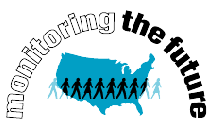 Children who misbehave usually do so for a purpose, taught U.S. psychiatrist and educator Rudolf Dreikurs. Misbehaving children and teens are acting out a feeling or need that they are unable to convey or express. Such a need might be: a need for attention when s/he is feeling ignored or neglected; a resentment over being controlled; a fear that s/he is not loved or lovable; or a feeling of inadequacy or helplessness.
Children who misbehave usually do so for a purpose, taught U.S. psychiatrist and educator Rudolf Dreikurs. Misbehaving children and teens are acting out a feeling or need that they are unable to convey or express. Such a need might be: a need for attention when s/he is feeling ignored or neglected; a resentment over being controlled; a fear that s/he is not loved or lovable; or a feeling of inadequacy or helplessness.
Polling Teen Use of Drugs and Alcohol
 The Monitoring the Future study, sponsored by the National Institute on Drug Abuse and designed and conducted by the University of Michigan, has been polling teens since 1975. Its most recent survey reports that alcohol and cigarette use by students in grades 8, 10, and 12 are at their lowest point since the project has been collecting the data. The good news is offset by a finding of high rates of abuse in other tobacco products, marijuana, and prescription drugs.
The Monitoring the Future study, sponsored by the National Institute on Drug Abuse and designed and conducted by the University of Michigan, has been polling teens since 1975. Its most recent survey reports that alcohol and cigarette use by students in grades 8, 10, and 12 are at their lowest point since the project has been collecting the data. The good news is offset by a finding of high rates of abuse in other tobacco products, marijuana, and prescription drugs.
How Parenthood Makes Life Meaningful and How Marriage Makes Parenthood Bearable
 A new State of Our Unions report (entitled “When Baby Makes Three”) from the National Marriage Project (NMP)* at the University of Virginia and the Center for Marriage and Families draws on data from three nationally representative surveys (2,870 couples in total) to answer four important questions about contemporary family life:
A new State of Our Unions report (entitled “When Baby Makes Three”) from the National Marriage Project (NMP)* at the University of Virginia and the Center for Marriage and Families draws on data from three nationally representative surveys (2,870 couples in total) to answer four important questions about contemporary family life:
Taking on Sibling Rivalry
 First the bad news: Sibling rivalry can not be eliminated entirely. Children are sensitive to differences in parental treatment from a young age, possibly even from the age of one year (Judy Dunn). By 3 years old, children already have a sophisticated grasp of social rules, can evaluate themselves in relation to their siblings, and know how to adapt to circumstances within the family.
First the bad news: Sibling rivalry can not be eliminated entirely. Children are sensitive to differences in parental treatment from a young age, possibly even from the age of one year (Judy Dunn). By 3 years old, children already have a sophisticated grasp of social rules, can evaluate themselves in relation to their siblings, and know how to adapt to circumstances within the family.
Getting Teens to Keep Agreements
 Giving up control, threats, punishment and “logical consequences” (a disguise for punishment) as methods to discipline your teen is NOT about settling for broken agreements and unkept promises. Rather, it opens the door for alternatives that can actually teach your teens to accept responsibility and achieve cooperation.
Giving up control, threats, punishment and “logical consequences” (a disguise for punishment) as methods to discipline your teen is NOT about settling for broken agreements and unkept promises. Rather, it opens the door for alternatives that can actually teach your teens to accept responsibility and achieve cooperation.
Are You Asking the Wrong Questions??
 Parents struggling with challenging adolescent behavior are often asking themselves (and their therapists) the wrong questions.
Parents struggling with challenging adolescent behavior are often asking themselves (and their therapists) the wrong questions.
They ask:
How do I make my teen listen to me?
How do I make my teen understand that “no” is “no”?
How do I get my teen to cooperate and do what I say?
How do I make my teen’s problematic behavior go away?
What would be an appropriate punishment or consequence for this particular behavior or situation?
Good Enough Mom
 The term “good enough mother” appears frequently in the media these past few weeks. A new book entitled Good Enough is the New Perfect by B.B. Gillespie and H.S. Temple (Harlequin Press, 2011) offers a new way of looking at work/life issues and of finding success and happiness in modern motherhood.
The term “good enough mother” appears frequently in the media these past few weeks. A new book entitled Good Enough is the New Perfect by B.B. Gillespie and H.S. Temple (Harlequin Press, 2011) offers a new way of looking at work/life issues and of finding success and happiness in modern motherhood.
I thought it might be interesting to explore the origin of the term “good enough mother,” given its centrality in the lexicon of child psychology.
Ask Beth: Honest Advice for Teens

“How can a boy kiss a girl who wears braces?”
“I have enormous ears…. Is there an operation to whittle them down to size?”
“I am in terrible trouble and I don’t know where to turn. I’m 14 and I’m pregnant.”
“Should I sleep with my boyfriend?” (asked by a 10-year-old girl)
During the cultural upheaval of the 1960s and 70s, questions arose as never before about formerly forbidden topics such as sex. Thousands of teenagers and their parents, unable to find answers elsewhere, sent letters (first on paper and later by email) to Elizabeth Winship’s “Ask Beth” column in The Boston Globe, seeking her frank, detailed, sympathetic, and often witty advice on how to deal with delicate topics.